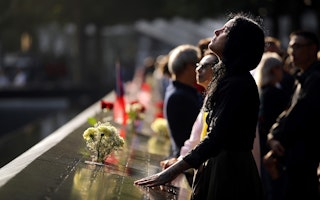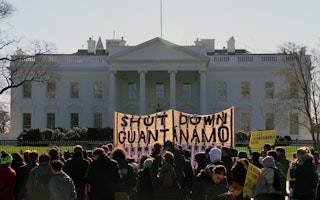Doctors Aided CIA Torture, Records Show
By Aryeh Neier & David J. Rothman
The core principles of medicine require physicians to protect patients from “harm and injustice,” to respect confidentiality, and to never take advantage of vulnerable patients. But the Central Intelligence Agency and the Department of Defense instructed physicians and other health professionals to disregard these principles while supervising detainees held by the United States in the so-called “war on terror.”
Ethics Abandoned, a new report released today by a 20-person task force of physicians, lawyers, and human rights experts, has found that health professionals:
- Aided cruel and degrading interrogations;
- Helped devise and implement practices designed to maximize disorientation and anxiety so as to make detainees more malleable for interrogation; and
- Participated in the application of excruciatingly painful methods of force-feeding of mentally competent detainees carrying out hunger strikes.
We have known for some time that lawyers in the Bush administration’s Department of Justice, the Defense Department, and CIA provided now discredited legal arguments in favor of the so-called "enhanced interrogation" of detainees. Until now, however, the ethical lapses of medical personnel have not received comparable attention. Accordingly, our task force was charged both to examine the public record and to propose recommendations to ensure that whatever abuses were uncovered would not be repeated in the future.
In this spirit, the report urges greater attention to medical education in ethical principles and conduct for military detention centers. It encourages professional medical and psychological associations to promote the relevant ethical standards among their members. Finally, it asks state licensing boards to hold health professionals accountable for their behavior and take action against those who violate their rules.
The performance of the physicians and other health personnel in detention practices is not only disappointing in its own right but stands in stark contrast to the exemplary professionalism manifested by some doctors in other contemporary conflicts. For example, it is worth noting that many physicians are serving patients despite the difficult and dangerous conditions of Syria’s civil war. When a Syrian doctor saves the life of a fellow citizen, he has risked his own.
Although scores of physicians are reported to have been killed, and hundreds more are said to have been imprisoned, doctors—some of them Syrians and some of them volunteers from such international humanitarian organizations as Médecins sans Frontières—continue to treat victims of the conflict from all factions. It is regrettable that this display of courage and professionalism was not matched by physicians who did not say “no” when U.S. government officials instructed them to violate fundamental ethical principles of their calling.
The report’s recommendations are vital because professionalism, the adherence to ethical rules, the maintenance of professional standards, and the readiness of the profession itself to enforce these standards, enhances the healing role of medical practice, builds patient and societal trust, and serves as a crucial curb on state abuses of power.
Professionalism, always important, is especially relevant in times of stress, as when the United States felt particularly vulnerable to terrorist attacks in the wake of the September 11 terrorist attacks. A commitment to professionalism is a form of insurance that ethical rules and standards of practice will be maintained when the pressure to violate them is the greatest.
The Ethics Abandoned report was supported by the Institute on Medicine as a Profession and the Open Society Foundations.

Aryeh Neier is president emeritus of the Open Society Foundations.
David J. Rothman is the president of the Institute on Medicine as a Profession.


